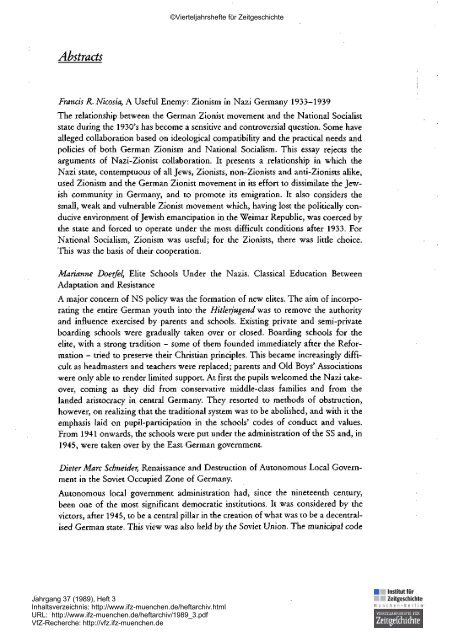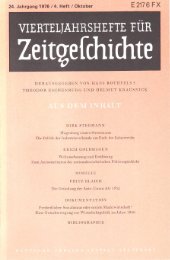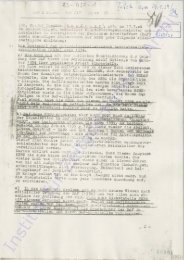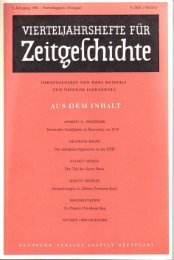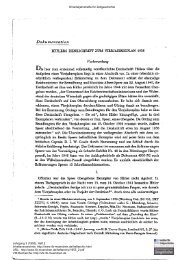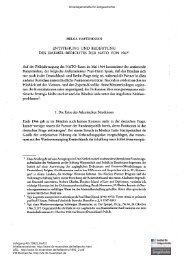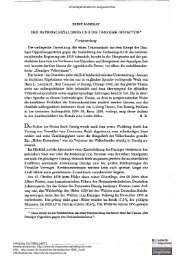Anhang - Institut für Zeitgeschichte
Anhang - Institut für Zeitgeschichte
Anhang - Institut für Zeitgeschichte
Erfolgreiche ePaper selbst erstellen
Machen Sie aus Ihren PDF Publikationen ein blätterbares Flipbook mit unserer einzigartigen Google optimierten e-Paper Software.
Abstracts<br />
Francis R.Nicosia, A Useful Enemy: Zionism in Nazi Germany 1933-1939<br />
The relationship between the German Zionist movement and the National Socialist<br />
state during the 1930's has become a sensitive and controversial question. Some have<br />
alleged collaboration based on ideological compatibility and the practical needs and<br />
policies of both German Zionism and National Socialism. This essay rejects the<br />
arguments of Nazi-Zionist collaboration. It presents a relationship in which the<br />
Nazi state, contemptuous of all Jews, Zionists, non-Zionists and anti-Zionists alike,<br />
used Zionism and the German Zionist movement in its effort to dissimilate the Jewish<br />
community in Germany, and to promote its emigration. It also considers the<br />
small, weak and vulnerable Zionist movement which, having lost the politically conducive<br />
environment of Jewish emancipation in the Weimar Republic, was coerced by<br />
the state and forced to operate under the most difficult conditions after 1933. For<br />
National Socialism, Zionism was useful; for the Zionists, there was little choice.<br />
This was the basis of their cooperation.<br />
Marianne Doerfel, Elite Schools Under the Nazis. Classical Education Between<br />
Adaptation and Resistance<br />
A major concern of NS policy was the formation of new elites. The aim of incorporating<br />
the entire German youth into the Hitlerjugend was to remove the authority<br />
and influence exercised by parents and schools. Existing private and semi-private<br />
boarding schools were gradually taken over or closed. Boarding schools for the<br />
elite, with a strong tradition - some of them founded immediately after the Reformation<br />
- tried to preserve their Christian principles. This became increasingly difficult<br />
as headmasters and teachers were replaced; parents and Old Boys' Associations<br />
were only able to render limited support. At first the pupils welcomed the Nazi takeover,<br />
coming as they did from conservative middle-class families and from the<br />
landed aristocracy in central Germany. They resorted to methods of obstruction,<br />
however, on realizing that the traditional system was to be abolished, and with it the<br />
emphasis laid on pupil-participation in the schools' codes of conduct and values.<br />
From 1941 onwards, the schools were put under the administration of the SS and, in<br />
1945, were taken over by the East German government.<br />
Dieter Marc Schneider, Renaissance and Destruction of Autonomous Local Government<br />
in the Soviet Occupied Zone of Germany.<br />
Autonomous local government administration had, since the nineteenth century,<br />
been one of the most significant democratic institutions. It was considered by the<br />
victors, after 1945, to be a central pillar in the creation of what was to be a decentralised<br />
German state. This view was also held by the Soviet Union. The municipal code


